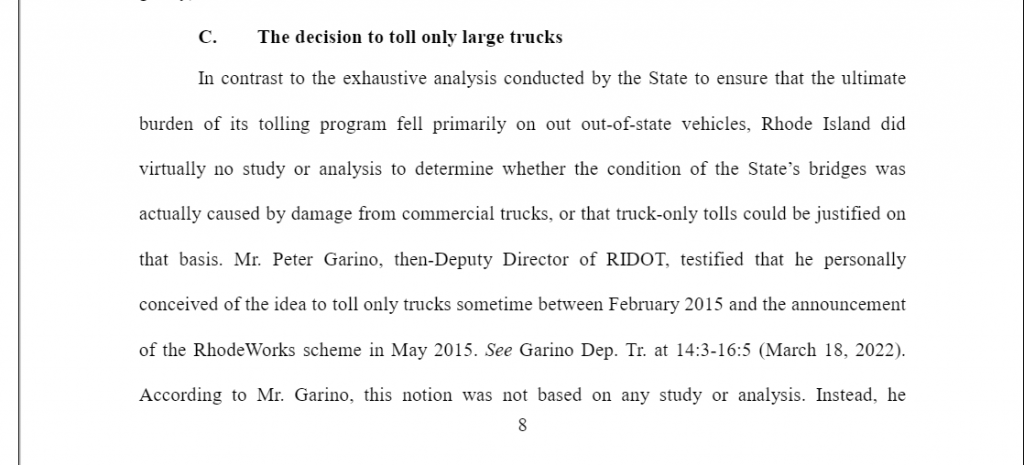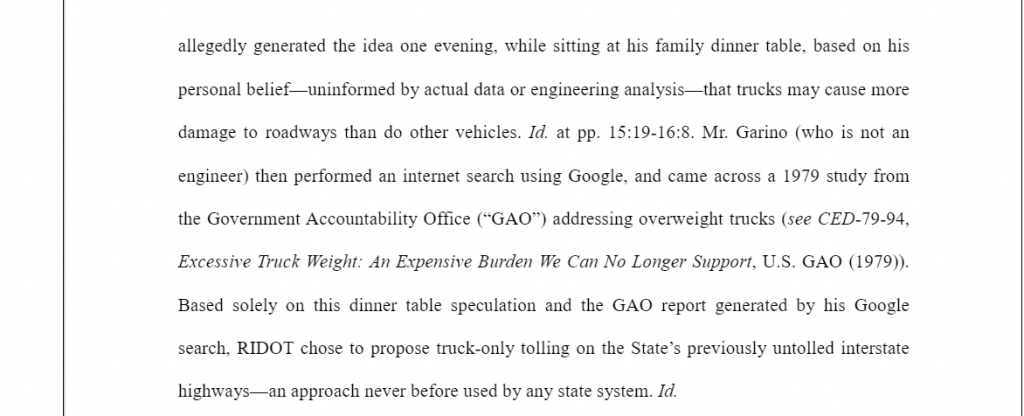Truck Tolls Are Back.
And while some will point out accurately that they have been inflicted on Rhode Island Consumers for years, (yes, consumers actually pay truck tolls in the form of increased prices for consumer goods, levied by the distribution companies who actually drove through the toll gantry) a trial years in the making begins this week in Federal Court, in Providence. Opening arguments were held this
At stake? Millions of dollars of toll revenue, but perhaps more importantly, a legal precedent for state’s Department of Transportations around the nation to raise revenue by targeting out of state shipping companies … a far more politically palatable solution than tolling angry voters, particularly during a post Covid period of worsening inflation, rising taxes & supply chain disruptions
The case, which will be held in Federal Court Monday morning, pits the likes of The American Trucking Associations (ATA), an 86 year old transportation industry juggernaut … Convenience store giant Cumberland Farms, with over 600 stores in 8 states … New England Motor Freight, which recently entered bankruptcy, despite being the nation’s 19th-largest LTL carrier with pre bankruptcy revenues exceeding $400 million & hometown heroes M&M Transport Services, against Peter Alviti, in his capacity as Director of The Rhode Island Department of Transportation (RIDOT)
The Plaintiff’s Perspective
The trial is essentially a legal referendum on “RhodeWorks”, a hangover from the Gina Raimondo administration, which sought to finance the repair of Rhode Island’s worst in the nation bridge infrastructure, by tolling large commercial vehicles. The evidence presented (see below) by the plaintiffs is stunning: a compelling read, it divulges a litany of incompetence, stupidity, & arrogance by Rhode Island State Officials. Example: the process that brought the State of Rhode Island to the notion of tolling only large trucks:


At work here, claim the plaintiffs, is a clear violation of the “dormant Commerce Clause” of the United States Constitution. The framers of The Constitution saw fit to prohibit individual states from interfering with, or placing undue burdens on interstate commerce. Alleging that in intentionally shifting the financial burden of the RhodeWorks program to out of state trucking concerns … intentionally and by design … the scheme unduly burdens interstate commerce by acting in both a protectionist & discriminatory manner. In effect, RIDOT is attempting to shift the financial burden of bridge repair to out of state truckers, applying a toll that unfairly discriminates against those forced to pay it because it doesn’t fairly apportion the costs to those who are responsible the burden (damaged bridges).
The Defendant’s Perspective
Conversely, the State of Rhode Island effectively claims that the dormant Commerce Clause governs the impact of legislation, not the underlying reasoning. The toll was properly legislated, therefore it is not unlike a tax. Additionally? The State of Rhode Island maintains that the law is presumed constitutional: Transportation companies cannot prove beyond a reasonable doubt that the statute in unconstitutional, which is, generally speaking, the standard to have a court declare a statute unconstitutional.
Curiously, Rhode Island buttresses the belief of certain victory in the Supreme Court, were it heard there, by citing quotes from the late Justice Scalia & current SCOTUS Justice Thomas, in years old dissenting opinions that disapprovingly speak of striking down state statutes under the dormant Commerce Clause, because those justices don’t believe the constitution actually contains wording referencing the dormant Commerce Clause. (Interestingly, the State seems to engage in a sudden embrace of textualism. Odd given that the legal ideology currently in vogue generally abhors that approach, portraying the US Constitution as a living breathing document.)
Finally, the Parties to a suit of this nature, usually lead with their strongest legal arguments. The plaintiffs cite binding US Supreme Court case law to support their arguments. The State of Rhode Island instead purports to be able to predict what the US Supreme Court will say based upon quotes from dissenting opinions and caselaw from Circuits that do not bind the Rhode Island federal court.
The plaintiffs lay out a succinct, step by step case, in a manner not unlike building blocks. From the Development of “The RhodeWorks Tolling Scheme”, to a clear cogent analysis of the legislation, and on to a breakdown of the “Discriminatory Impact On Interstate Commerce”, followed by a dissertation on the “Controlling Commerce Clause Principles”, the State may soon realize that the House of Cards upon which truck trolling is based, may soon collapse.
Dkt 172--Plaintiffs' proposed findings of facts and conclusions of law
Dkt 175--Defendants' proposed findings of fact and conclusiions of law






Pingback: The Decision! American Trucking Associations, et al V. Peter Alviti & The Rhode Island Bridge & Tunnel Authority - Coalition Radio Network